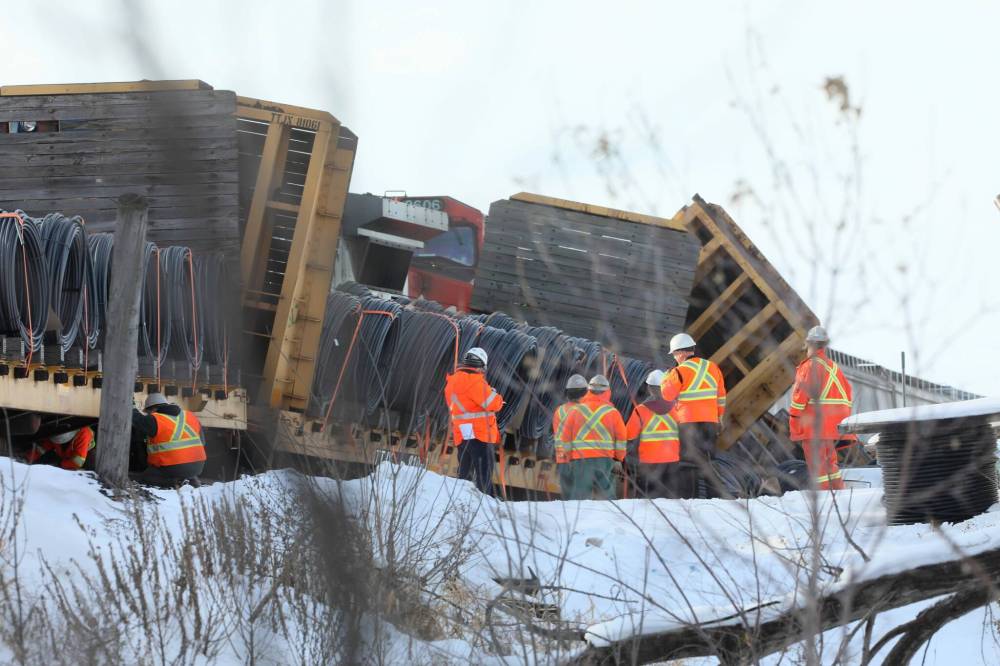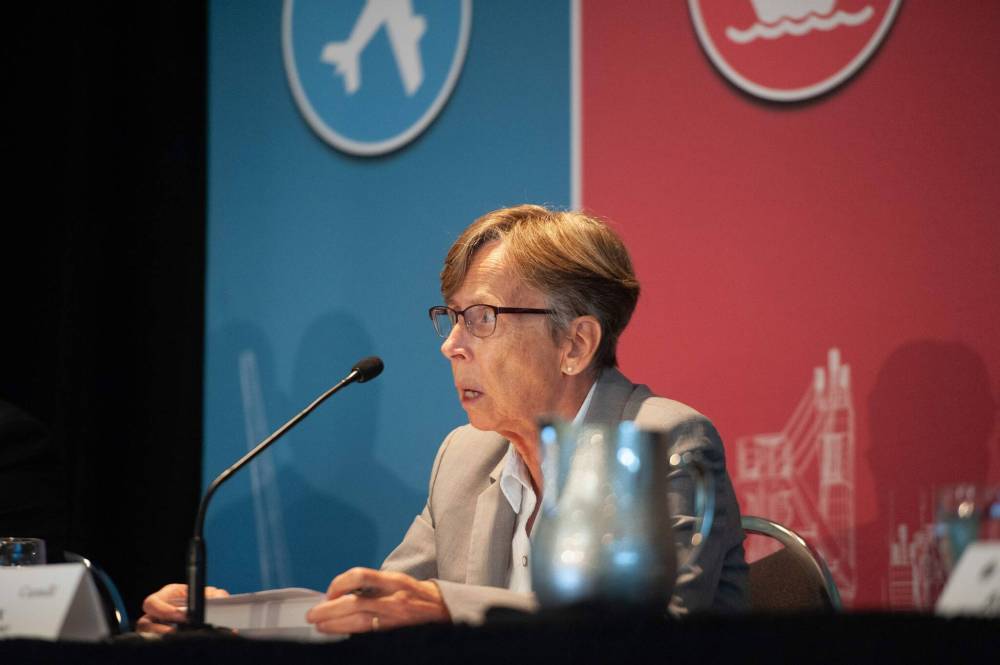Fatigue, inexperience caused 2019 collision, derailment of trains near Portage: report
Advertisement
Read this article for free:
or
Already have an account? Log in here »
To continue reading, please subscribe:
Monthly Digital Subscription
$0 for the first 4 weeks*
- Enjoy unlimited reading on winnipegfreepress.com
- Read the E-Edition, our digital replica newspaper
- Access News Break, our award-winning app
- Play interactive puzzles
*No charge for 4 weeks then price increases to the regular rate of $19.00 plus GST every four weeks. Offer available to new and qualified returning subscribers only. Cancel any time.
Monthly Digital Subscription
$4.75/week*
- Enjoy unlimited reading on winnipegfreepress.com
- Read the E-Edition, our digital replica newspaper
- Access News Break, our award-winning app
- Play interactive puzzles
*Billed as $19 plus GST every four weeks. Cancel any time.
To continue reading, please subscribe:
Add Free Press access to your Brandon Sun subscription for only an additional
$1 for the first 4 weeks*
*Your next subscription payment will increase by $1.00 and you will be charged $16.99 plus GST for four weeks. After four weeks, your payment will increase to $23.99 plus GST every four weeks.
Read unlimited articles for free today:
or
Already have an account? Log in here »
Hey there, time traveller!
This article was published 24/08/2022 (1168 days ago), so information in it may no longer be current.
The collision and subsequent derailment of two CN freight trains near Portage la Prairie in 2019 was caused by human error — brought on by fatigue and inexperience — and the lack of a fail-safe stopping system, a Transportation Safety Board report says.
Board chair Kathy Fox said the watchdog has been calling for measures, including different training and systems to automatically slow or stop trains, to stop similar accidents for more than 20 years.
“If we look back to when the TSB first made a recommendation back in 2000 for additional back-up safety defences, and then again in 2013 for some sort of physical fail-safe safety controls, the actions taken by the industry have tended to focus on what we call administrative defences — increases in rules, training, procedures, etc.,” she said at a press conference on the release of the report Wednesday.
“But as we know, errors happen, people don’t always follow the rules, even with the best of intentions, so that’s why we’ve been calling now for 22 years for physical fail-safe train defences.”
WINNIPEG FREE PRESS FILES Workers with CN look over the damage after train cars derailed west of the Assiniboine River in 2019.
The derailment on Jan. 3, 2019 just east of Portage slightly injured two crew members and leaked nearly 16,000 litres of diesel fuel.
An eastbound CN freight train hit the side of a westbound freight train on the Rivers Subdivision, one of CN’s busiest routes that frequently transports dangerous goods, near a bridge over the Assiniboine River at about 9:15 that morning.
The eastbound train’s crew was using a system similar to cruise control when it passed a signal to prepare to stop at the next signal just over three kilometres away. The conductor called out that signal to the engineer, but didn’t hear them respond. The train kept moving at the same speed.
The board found the engineer was fatigued from a lack of sleep, but the conductor had less experience than the engineer — so the conductor deferred to him without question.
ETHAN CAIRNS / WINNIPEG FREE PRESS
Kathy Fox said the same type of accident will likely again occur — if the industry and the federal transportation regulator don’t make changes. 
Soon after, the front engines of each of the trains passed each other, and the conductor reminded the engineer to stop. The engineer then applied the brakes but the crew realized they couldn’t stop in time, so they hit the emergency brakes. The eastbound train then hit the westbound train at 37 km/h and its crew jumped out. The westbound train’s crew was far from the collision and weren’t hurt.
The eastbound train was carrying 32 tanker cars loaded with crude oil, one with liquid gasoline, four tankers with pentane residues, one with methanol residue and one with sodium hydroxide residue — all classified as dangerous goods.
However, none of the cars containing dangerous goods derailed. The eastbound train’s two front engine cars derailed, as did eight of the westbound train’s cars.
The board, an independent safety agency that investigates train, air, marine and pipeline accidents and incidents, issued two recommendations to Transport Canada and the rail industry on Wednesday to prevent the same type of collision from happening again.
WINNIPEG FREE PRESS FILES The derailment on Jan. 3, 2019 just east of Portage slightly injured two crew members and leaked nearly 16,000 litres of diesel fuel.
Fox said the same type of accident will likely again occur — if the industry and the federal transportation regulator don’t make changes.
“Our statistics have shown that on average, at least between 2004 and 2021, there have been an average of 35 such events annually,” Fox said.
“That doesn’t imply they’re all collisions, but they could lead to derailments or other types of events. We’ve seen a number of cases where there have been collisions, or there have been derailments, that in addition to the damage to the train, there can be other consequences for crew and for property and the environment in the immediate area.”
Fox said Transport Canada should require all major railways to quickly put in place physical fail-safe stopping systems that would automatically stop or slow trains headed for collisions or accidents, following warnings, on high-speed lines and routes designated for dangerous goods. Transport Canada is the federal department in charge of regulations, policies and services for road, rail, marine and air transportation.
“There’s a sense of urgency that’s lacking– and that’s why we’ve made this third recommendation.” – Cathy Fox
After a collision between a commuter train and a freight train in Chatsworth, Calif., in 2008, the American federal government passed legislation mandating a fail-safe stopping system on main rail lines that transport dangerous goods, as well as intercity and commuter trains, Fox said.
Canada’s two major rail companies, CN and Canadian Pacific, both operate in the U.S. and are already subject to that regulation south of the border.
Fox noted that Canada’s regulator issued a notice of intention to move forward on the issue in February this year, but haven’t provided details or a timeline.
“There’s a sense of urgency that’s lacking — and that’s why we’ve made this third recommendation,” Fox said.
The TSB’s recommendations are not legally binding.
Fox also said the governing body should also require all railways to develop and put in place formal crew resource-management training for employees to qualify to operate trains. That’s a training method meant to eliminate or at least limit communication errors between employees.
erik.pindera@freepress.mb.ca
Twitter: @erik_pindera

Erik Pindera is a reporter for the Free Press, mostly focusing on crime and justice. The born-and-bred Winnipegger attended Red River College Polytechnic, wrote for the community newspaper in Kenora, Ont. and reported on television and radio in Winnipeg before joining the Free Press in 2020. Read more about Erik.
Every piece of reporting Erik produces is reviewed by an editing team before it is posted online or published in print — part of the Free Press‘s tradition, since 1872, of producing reliable independent journalism. Read more about Free Press’s history and mandate, and learn how our newsroom operates.
Our newsroom depends on a growing audience of readers to power our journalism. If you are not a paid reader, please consider becoming a subscriber.
Our newsroom depends on its audience of readers to power our journalism. Thank you for your support.
History
Updated on Wednesday, August 24, 2022 1:44 PM CDT: Photos changed.
Updated on Wednesday, August 24, 2022 2:13 PM CDT: Corrects name of TSB chair Kathy Fox.

